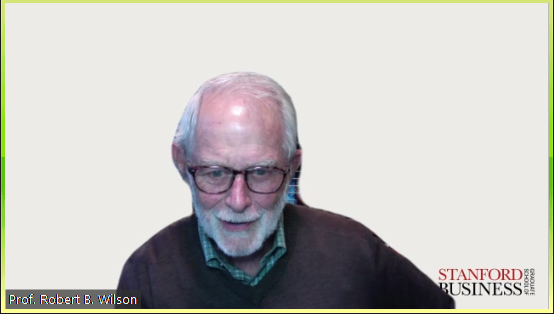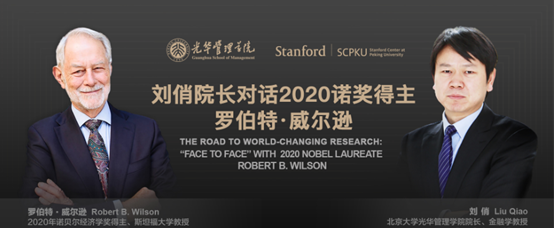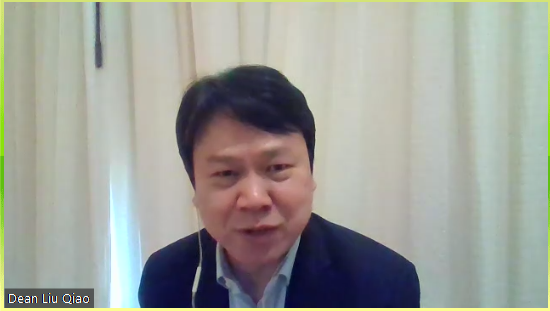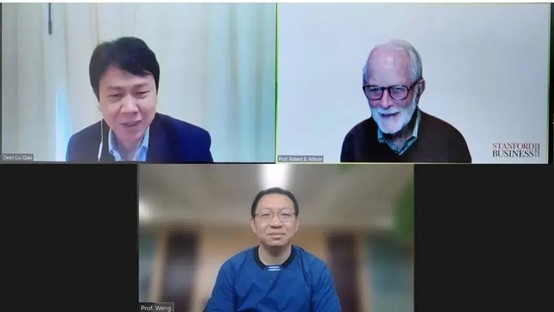Peking University, May 3, 2021: On
April 22, the Guanghua School of Management at Peking University, in
collaboration with Stanford Center at Peking University, hosted a
conversation between the 2020 Nobel Laureate Robert B. Wilson and
Guanghua Dean Liu Qiao. The event, titled “The Road to World-changing
Research” was streamed live on two bilingual platforms and engaged over
1200 participants from 20 countries. The eager audience consisted of
faculty, students, and alumni of Peking University and Stanford
University.
At the event, Professor Wilson shared his personal experience as a
scholar, a consultant, and an educator. He emphasized the importance of
integrating theoretical and empirical research in addressing real-world
problems.
Sources for original research
The conversation started off with Professor Wilson recounting his early
career and motivations for his research focus. Having always been
perplexed by the practical aspects of economic theory, Professor Wilson
turned down a job offer after graduating with an MBA and joined the
doctoral program. He remembers this education experience as “very
stimulating” and attributed his strong interest in game theory to his
mentor, Howard Raiffa (co-author with R. Duncan Luce of Games and
Decisions). In fact, Professor Wilson finds his close affiliation with
the business school to be more stimulating than if he had confined
himself to the economics department. He believes that the latter has a
tendency to be wedded to a canonical view of how the economy works,
whereas the former presents problems in a concrete and practical way
that encourages original research. “You cannot develop some research and
then put it to work”, he argues, “the theory needs to be developed as
an explanation of the feature you observe in the practical situation.”
It is from these concrete problems that Professor Wilson derives his
ideas for research. On this point, Dean Liu agrees that problems are the
best source for new theory.

The “Consultant” story behind the Nobel-winning auction format
Professor Wilson won the Nobel Prize in Economics jointly with his
doctoral student, Professor Paul Milgrom, for their contributions to the
theory of auctions and for the invention of new auction formats for
goods and services that could not be efficiently sold in more
traditional types of auction. During the conversation, Professor Wilson
also elaborated on his involvement in the spectrum auction of FCC
(Federal Communication Commission) in 1993 and the design process of the
simultaneously ascending auction model. He explained that their main
ideas for the design came from previous work, which established that
dynamic auctions (conducted overtime and in successive stages) elicits
more information from the bidders and reduces the risk of “the winner’s
curse.” By having a simultaneous ascending auction, the design enabled
telephone companies to pick a portfolio of licenses that would best
serve their needs. The format improves efficiency by making people who
were choosing among the licenses price-takers. He recalled, “the design
at the time seemed very natural and had the desired effect.”
Dean Liu supports this approach of combining theory with practice in
solving real-world problems, such as carbon neutrality. In the case of
carbon reduction, Professor Wilson suggests that research could be
helpful in finding out the optimal quantity of carbon emission before
implementing a cap-and-trade system.
An accomplished and encouraging educator
As an active educator for over 50 years at Stanford University,
Professor Wilson always makes his courses “current” and keeps pace with
his ongoing projects. Being the mentor of three Nobel Prize winners
(Alvin Roth, Bengt Holmstrom, and Paul Milgrom), Professor Wilson always
encourages his students to follow their own ideas and provides them
with the necessary skills and criticism to get further in pursuing their
interests. He cautions young faculty members of business schools
against being locked into the paradigm. “The absolute truth taught in
the PhD department is just an intellectual construction,” he argues,
“researchers should seek to challenge the paradigm and figure out how it
works in the real-world with real people.” He stresses that each of the
trinity—experimental work, theoretical work, and empirical
work—supports one another. Professor Wilson also expresses great faith
in Chinese researchers, “It shouldn’t be long before China will have one
of its own Nobel Laureates in Economics.”
The future of business school research
Finally, Professor Wilson addresses one of the biggest challenges faced
by business schools: the balance between theoretical research and
practical work. He views the advancement of knowledge as an accumulation
of little findings that culminates in big breakthroughs. To achieve
such breakthroughs, he emphasizes the importance of both mundane
involvement in practical issues and rigorous engagement in higher
theory. Professor Wilson proposes that young faculty members could think
of consulting experiences as a search for research topics and use this
as a standard when selecting projects.
Dean Liu Qiao (top left), Profess Robert B. Wilson (top right), Professor Weng Xi (below)
TheGuanghua School of Management is widely recognized as the premier
business school in China with multiple programs that routinely rank
among the best in Asia. Guanghua's preeminent faculty and students have
played key roles in China's economic development, putting Guanghua in a
unique position to bring the world to China and China to the world.
The Guanghua School of Management's "The Thought Leader Series" hosts
renowned thought leaders from business, government, and nonprofit
organizations to share their unique insights on business, society,
China, and the world. This series aims to provide a platform in which
faculty, students, alumni, and Guanghua friends and company partners can
learn, exchange ideas, and drive positive change in their communities.
Edited by: Huang Weijian
Source: Guanghua School of Management, Peking University



